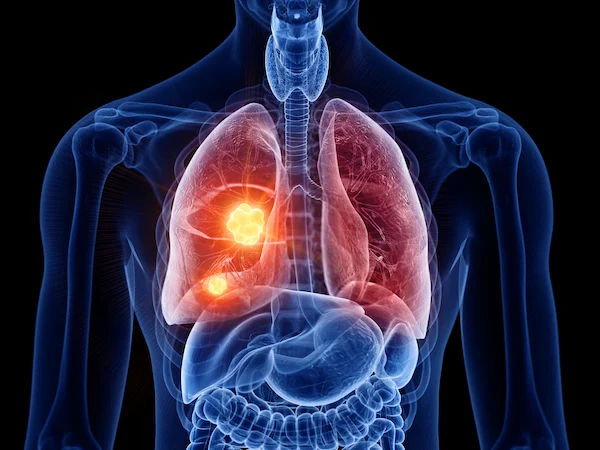Self-Care Strategies for Lung Cancer Patients
Discover simple and effective self-care tips for lung cancer patients to manage symptoms, boost strength, and improve emotional well-being alongside medical treatment.


Dealing with lung cancer can be overwhelming, both physically and emotionally. While medical treatments like chemotherapy, radiation, or surgery are essential, self-care plays a crucial role in improving your quality of life. Taking care of your body and mind can help you manage symptoms, reduce stress, and stay stronger during treatment.
Here are some simple yet effective self-care strategies to support your well-being as a lung cancer patient.
1. Focus on Nutrition
Eating well is vital to keep your body strong during treatment. Some patients experience loss of appetite, nausea, or taste changes, making it difficult to eat enough. Here’s how you can maintain good nutrition:
Eat small, frequent meals – Instead of three large meals, try 5-6 smaller meals throughout the day.
Choose high-protein foods – Eggs, yoghurt, lean meats, beans, and nuts help in healing and maintaining strength.
Stay hydrated – Drink plenty of water, herbal teas, or broths to prevent dehydration.
Avoid processed foods – Opt for fresh fruits, vegetables, and whole grains to boost immunity.
If eating is difficult, consult a nutritionist who can suggest meal plans or supplements.
2. Gentle Exercise & Breathing Techniques
Lung cancer can make breathing harder, but light physical activity can improve lung function and reduce fatigue.
Short walks – Even a 10-minute walk daily can help maintain stamina.
Deep breathing exercises – Techniques like pursed-lip breathing (inhale through the nose, exhale slowly through pursed lips) can ease breathlessness.
Yoga or stretching – Gentle movements improve flexibility and relaxation.
Always check with your doctor before starting any exercise routine.
3. Manage Fatigue & Rest Well
Cancer-related fatigue is common, but proper rest can help.
Take short naps – Rest when needed, but avoid long daytime naps that disrupt nighttime sleep.
Maintain a sleep routine – Go to bed and wake up at the same time daily.
Limit caffeine & screen time before bed – Helps in better sleep quality.
Consult Top Specialists
4. Emotional & Mental Well-being
Lung cancer can bring anxiety, depression, or stress. Taking care of your mental health is just as important as physical care.
Talk to loved ones – Sharing feelings with family or friends can provide comfort.
Join a support group – Connecting with others facing similar challenges can be reassuring.
Practice mindfulness – Meditation, deep breathing, or journaling can reduce stress.
Consider counselling – A therapist can help you cope with emotional struggles.
5. Manage Treatment Side Effects
Chemotherapy and radiation can cause side effects like nausea, mouth sores, or skin irritation. Here’s how to manage them:
Nausea – Eat bland foods (toast, crackers), sip ginger tea, or ask your doctor about anti-nausea medications.
Mouth sores – Rinse with saltwater, avoid spicy foods, and use a soft toothbrush.
Skin care – Use fragrance-free moisturisers if radiation causes dryness or irritation.
Always report severe side effects to your doctor.
6. Avoid Infections
Cancer treatments can weaken your immune system, making infections riskier.
Wash hands frequently – Especially before eating or touching your face.
Avoid crowded places – If possible, stay away from large gatherings to reduce exposure to germs.
Stay up-to-date with vaccinations – Ask your doctor about flu or pneumonia shots.
7. Quit Smoking & Avoid Pollutants
If you smoke, quitting is one of the best things you can do for your lungs. Even after a diagnosis, stopping smoking can improve treatment effectiveness.
Seek support – Nicotine patches, counselling, or support groups can help.
Avoid secondhand smoke & air pollution – Use air purifiers indoors and wear a mask in polluted areas.
8. Stay Connected with Your Healthcare Team
Regular check-ups and open communication with your doctor are crucial.
Keep track of symptoms – Note any new or worsening symptoms to discuss with your doctor.
Follow-up appointments – Don’t skip follow-ups, even if you feel better.
Ask questions – If unsure about any part of your treatment, ask for clarification.
When to Seek Help?
While self-care is helpful, some symptoms need immediate medical attention. Contact your doctor if you experience:
Severe shortness of breath
High fever or signs of infection
Uncontrolled pain
Sudden weight loss or inability to eat
Conclusion
Living with lung cancer is challenging, but self-care can make a big difference in how you feel. Small steps, like eating well, staying active, and managing stress, can improve your strength and emotional well-being.
If you need personalised advice, Apollo 24|7 offers expert consultations and support for lung cancer patients. You can book an appointment or schedule tests easily through their platform.
Consult Top Specialists
Consult Top Specialists
Dr. Gaddam Manoj
General Practitioner
1 Years • MBBS
Hyderabad
Aaradhya clinic, Hyderabad
Dr. Sahana B
General Practitioner
3 Years • MBBS
Koppal
Khushi multi-speciality hospital, Koppal

Dr Suseela
General Physician
5 Years • MBBS
Bengaluru
Apollo Medical Center, Marathahalli, Bengaluru

Dr. Mainak Baksi
General Practitioner
13 Years • MBBS , MD (MPH)
Howrah
Mainak Baksi Clinic, Howrah
(50+ Patients)

Dr. Rajib Ghose
General Practitioner
25 Years • MBBS
East Midnapore
VIVEKANANDA SEBA SADAN, East Midnapore


